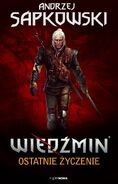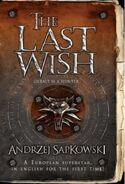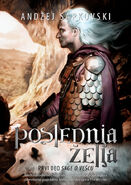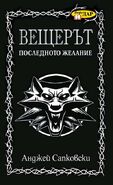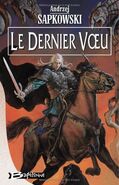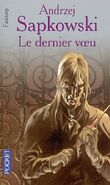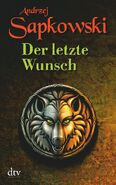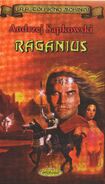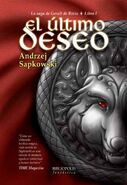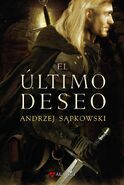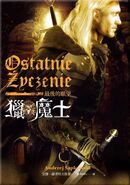Последнее желание (ориг. Ostatnie życzenie) — сборник рассказов писателя Анджея Сапковского в жанре фэнтези, объединённых общим персонажем — ведьмаком Геральтом из Ривии.
Это первое произведение из цикла «Ведьмак» как по хронологии, так и по времени написания. От первого издания в виде книги «Ведьмак» «Последнее желание» отличается связующей серией интерлюдий «Глас рассудка».
Рассказы, вошедшие в книгу[]
- Ведьмак (польск. Wiedźmin, 1986)
- Крупица истины (польск. Ziarno prawdy, 1989)
- Меньшее зло (польск. Mniejsze zło, 1990)
- Вопрос цены (польск. Kwestia ceny, 1990)
- Край света (польск. Kraniec świata, 1990)
- Последнее желание (польск. Ostatnie życzenie, 1993)
- Глас рассудка (польск. Głos rozsądku, 1993)
Хронологическая последовательность рассказов:[]
- Крупица истины
- Меньшее Зло
- Вопрос цены
- Край света
- Последнее желание
- Ведьмак
- Глас рассудка
Российские издания[]
| Издательство | Серия | В составе книги | ISBN | Дата публикации |
|---|---|---|---|---|
| «Аквилон» | Нет | «Ведьмак» (Частично) | Нет | 1991 |
| «АСТ» «Terra Fantastica» |
«Век Дракона» | «Ведьмак» | 5-7921-0081-0 5-88196-818-2 |
1996 |
| «АСТ» | «Золотая серия фэнтези» | «Последнее желание. Меч Предназначения» | 5-17-008511-7 | 19.04.2003 |
| «АСТ» «Люкс» |
Нет | «Последнее желание. Меч Предназначения» | 5-17-023133-4 5-9660-0091-3 |
26.10.2004 |
| «АСТ» | «Библиотека Фантастики» | «Геральт» | 5-17-024518-1 | 3.08.2004 |
| «АСТ» | «Библиотека мировой фантастики» | «Геральт» | 5-17-024519-Х | 3.08.2004 |
| «АСТ» | «Век Дракона» | «Последнее желание. Меч Предназначения» | 978-5-17-042917-2 978-5-9713-4602-9 |
2007 |
| «АСТ» | «Лучшая фантастика» | «Последнее желание» |
978-5-17-047902-3; 978-5-9713-7060-4; 978-5-226-00392-9 |
2008 |
| «АСТ» | Подарочное издание | «Ведьмак» | 978-5-17-075073-3 | 2013 |
| «АСТ» | «Сапковский с иллюстрациями» | «Ведьмак. Последнее желание» | 978-5-17-090841-7 | 2015 |
| «АСТ» | «Легендарные фантастические сериалы» | «Ведьмак» | 978-5-17-073052-0 | 2020 |
Мировые издания[]
| Страна | Книга (Издательство, год) |
|---|---|
| Болгария | Вещерът. Последното желание (ИнфоДар, 2008) |
| Чехия | Zaklínač I — Poslední přání (Leonardo, 1999) |
| Нидерланды | De Laatste Wens (Dutch Media Uitgevers, 2010) |
| Англия, США | The Last Wish, перевод Данусия Сток (UK — Gollancz, 2007; US — Orbit, 2008) |
| Франция | Le Dernier Vœu (2003) |
| Германия | Der letzte Wunsch (Heyne, 1998) |
| Италия | Il Guardiano degli Innocenti (Nord, 2010) |
| Корея | 위처:이성의 목소리 (제우미디어, 2011) |
| Литва | Paskutinis noras (Eridanas, 2005) |
| Польша | Ostatnie życzenie (SuperNOWA, 1993) |
| Беларусь | Апошняе жаданне, перевод К. С. Матиевской (А.М. Янушкевич, 2019) |
| Португалия | O Último Desejo (Livros do Brasil, 2005) |
| Испания | El último deseo, перевод Jose María Faraldo (Bibliópolis fantástica, 2002) |
| Сербия | Последња жеља/Poslednja želja, перевод Оливера и Милана Дусковых (IPS, 2009) |
| Финляндия | Viimeinen toivomus, перевод Tapani Kärkkäinen (WSOY 2010) |
| Швеция | Den sista önskningen |
| Венгрия | Vaják I. — Az utolsó kívánság, перевод Szathmáry-Kellermann Viktória (PlayON 2011) |
| Китай | 獵魔士 — 最後的願望, перевод 林蔚昀 (蓋亞文化, 2011) |
Дополнительно[]
- «Последнее желание» — упоминаемый в игре «Ведьмак» научный труд в обложке с тиснением, посвященный гениям стихий.
Галерея[]
Польские издания[]
Первое издание в мягком переплёте
Второе издание в мягком переплёте
Третье издание в мягком переплёте
Четвёртое издание в мягком переплёте, создано совместно с «CD Projekt RED»
Издания на английском языке[]
Великобританское издание для массового рынка, мягкий переплёт (2008)
Издание для США (2008)
Издания на других языках[]
Шведское издание (2010)
Сербское издание (2012)
Болгарское издание (2008)
Первое Чешское издание
Новое Чешское издание
Последнее Чешское издание
Датское издание
Финское издание
Французское издание (2003)
Французское издание (2005)
Французское издание (2008)
Первое Немецкое издание
Последнее Немецкое издание
Венгерское издание
Итальянское издание (2010)
Литовское издание
Португальское издание
Испанское издание
Испанское издание (Издательство «Alamut»)
Китайское издание
| Серия «Ведьмак» | ||||||||
|---|---|---|---|---|---|---|---|---|
|
This article is about the short story collection. For the rock band, see The Last Wish (band).
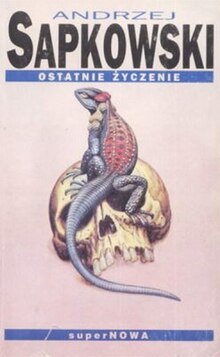
First edition cover |
|
| Author | Andrzej Sapkowski |
|---|---|
| Original title | Ostatnie życzenie |
| Translator | Danusia Stok |
| Country | Poland |
| Language | Polish |
| Series | The Witcher |
|
Release number |
1 |
| Genre | Fantasy |
| Publisher | SuperNowa |
|
Publication date |
1993 |
|
Published in English |
2007 |
| Media type | Print (hardback & paperback) |
| Pages | 288 |
| ISBN | 978-0-575-08244-1 |
| Preceded by | «The Road with No Return» |
| Followed by | Sword of Destiny |
The Last Wish (Polish: Ostatnie życzenie) is the third[a] published short story collection in Polish fantasy writer Andrzej Sapkowski’s The Witcher series. Published by SuperNowa in 1993,[1] it was preceded by 1992’s Sword of Destiny, but is officially considered the first entry in the series and Sword of Destiny the second. The collection contains seven short stories interspersed with a continuing frame story: Geralt of Rivia, after having been injured in battle, rests in a temple. During that time he has flashbacks to recent events in his life, with each flashback forming a short story.
The Last Wish was first published in English on 7 June 2007 by Gollancz,[2][3] and has also been translated into several other languages. In 2003, it won the Premio Ignotus for Best Anthology.
Plot[edit]
«The Witcher»[edit]
Wiedźmin
- «The Voice of Reason» (Głos rozsądku) Part I — In Ellander’s Temple of Melitele, a wounded Geralt is awakened from his slumber by Iola, a mute servant. The two make love, and fall asleep together, with Geralt dreaming of his fight with the monster who wounded him.
The King of Temeria, Foltest, has offered a reward to anyone who can lift the curse on his daughter, Adda (the result of an incestuous union with his late sister, also named Adda), who was born as a striga, and terrorizes the town every night. Foltest insists that his daughter not be harmed, but grants Geralt permission to kill her if Adda cannot be returned to human form. Geralt is unsure whether Adda can live as a «normal» human even if the curse is lifted.
Geralt prepares to spend the night at the old palace which houses the striga. Lord Ostrit, a magnate from Novigrad, tries to bribe Geralt into leaving. Ostrit wants to use the striga as proof of Foltest’s inability to rule, convincing Temeria’s people to support Novigrad’s usurpation of Foltest. Geralt refuses and knocks out Ostrit to use him as bait.
Geralt fights and defeats the striga, despite the striga’s resistance to silver. Unable to subdue the striga, Geralt seals himself into its crypt, forcing it to spend the night outside its lair, lifting the curse. In the morning, Geralt approaches the seemingly-restored Adda, but the girl attacks him and claws his neck. Geralt binds his wounds and faints, but regains consciousness in the temple, being told that Adda is being cared for by the King and Geralt has earned his reward.
«A Grain of Truth»[edit]
Ziarno prawdy
- «The Voice of Reason» Part II — In the morning, priestess Nenneke awakens Geralt and Iola, and insists Geralt take part in a trance with Iola, which would show them Geralt’s future. Geralt refuses.
While traveling through a forest, Geralt comes across the corpses of a man and a girl with strange wounds. Tracing the corpses’ path, the Witcher arrives at a seemingly deserted mansion. He notices a woman in the forest nearby watching him, who runs away.
Geralt approaches the house and its owner, a bear-like beast named Nivellen, fails to scare him away. Nivellen allows Geralt to enter the house, which supernaturally obeys Nivellen’s commands. Nivellen relates that, as the leader of his late father’s gang of bandits, he raped a priestess of a temple, who cursed him to be a beast before killing herself. The priestess told him how to lift the curse, but he has forgotten her words, which were related to a kiss from a woman.
Returning to his family mansion, he invited the daughters of local villages to stay with him, rewarding their families from his treasury. None lifted his curse, and eventually he gave up, enjoying their company. Before departing, Geralt warns Nivellen that his newest relationship, named Vereena, may actually be a monster. Nivellen insists that he and Vereena are in love and is hesitant to break his curse, unsure if she would love him if he was an «ordinary» human. Geralt leaves.
Along the road, Geralt has a realization and returns to the mansion. He meets Vereena, whom Geralt identifies as a bruxa, a vampire-like monster. She loves Nivellen, but has been killing and feeding on his other female companions, including the girl and her father that Geralt found in the woods. A fight ensues. The bruxa overwhelms Geralt, but Nivellen joins the fray and impales her on a pole. The bruxa confesses her love for Nivellen just before Geralt kills her. The confession breaks Nivellen’s curse and he returns to normal. Geralt confides that the old stories about a kiss from a maiden lifting a curse like Nivellen’s contain «a grain of truth»: there has to be true love for the cure to work.
«The Lesser Evil»[edit]
Mniejsze zło
- «The Voice of Reason» Part III — Two knights of the Order of the White Rose, Count Falwick and Sir Tailles, arrive. They are ordered by the prince of Ellander to chase Geralt, «the Butcher of Blaviken», out of town. Geralt promises to leave in three days. Insulted, Tailles challenges Geralt to a duel, and the knights promise to return.
On the eve of a festival, Geralt rides into the town of Blaviken with a monster carcass in tow. He seeks out Caldemeyn, the town’s alderman, to try to get a reward for killing the monster. Caldemeyn refuses, but one of his guards directs him to the town wizard. They head to the wizard’s tower, and Geralt discovers the wizard is Stregobor, a mage he has met previously. Stregobor claims that a supposedly cursed woman wants to assassinate him, and wants Geralt’s protection. Geralt refuses in disbelief and leaves.
Meanwhile, the assassin, named Renfri, has entered Blaviken along with her band of mercenaries. Geralt meets her in a local tavern, and she explains to Geralt and Caldemeyn that she is under protection from a king, which Caldemeyn confirms. That night, Geralt finds Renfri, who explains that Stregobor had previously tried to kill her for simple superstition, and encourages Geralt to kill Stregobor instead. Geralt refuses, and pleads with Renfri to forgive Stregobor to prove the superstition wrong. Renfri refuses, but implies she will leave town, before spending the night with Geralt.
In the morning, on the day of the festival, Geralt realizes that Renfri lied, and will massacre the people of Blaviken to draw Stregobor out of his tower. Geralt races to the marketplace and finds Renfri’s mercenaries. Although they show no ill intent, Geralt attacks and kills them. When Renfri arrives, Geralt asks her to leave, but she refuses, so Geralt kills her. After the fight, Stregobor approaches Geralt, intent on performing an autopsy on Renfri’s body to prove that the curse had physically affected her. Geralt stops him. Stregobor leaves, and the townsfolk, believing Geralt had just murdered a group of innocent men, hurl rocks at him. Caldemeyn stops the villagers, but demands Geralt leave Blaviken and never return. Geralt is now known as «the Butcher of Blaviken.»
«A Question of Price»[edit]
Kwestia ceny
- «The Voice of Reason» Part IV — Geralt tells Iola his history as a Witcher.
Geralt is at the castle of Cintra, at the invitation of Queen Calanthe, attending the betrothal celebration for Crown Princess Pavetta. An uninvited knight with his face covered enters. He introduces himself as Urcheon of Erlenwald and claims Pavetta’s hand in marriage, promised to him by her father Roegner, whose life Urcheon saved, before Pavetta’s birth. Calanthe admits that he has a claim, but refuses to marry her daughter to a stranger. She orders him to remove his helmet and tricks him to make him think it’s past midnight when he can remove the helmet. To everyone’s shock, he has the face of a furry beast.
Geralt asks Pavetta whether she will agree to marry Urcheon. To the outrage of the other suitors, she accepts. The suitors attack Urcheon, but he is defended by Geralt and the King of Skellige, Eist Tuirseach, who loves Calanthe. The attack provokes Pavetta, revealing her latent magical powers, which threaten to destroy the castle until Geralt and Eist’s druid councilor, Mousesack, subdue her. When the princess approaches Urcheon, he transforms into a man named Duny. Pavetta and Duny have been seeing each other secretly, and fallen in love. Calanthe agrees to their marriage, and, having been saved from Pavetta’s magical outburst by Eist, agrees to marry him. Thanking Geralt for saving him, Duny offers him whatever he asks. Geralt invokes The Law of Surprise, the same law which gave Duny his claim to Pavetta’s hand. Pavetta reveals that she is pregnant, so Geralt has a right to claim the child. He leaves, showing no sign of wanting to do so.
«The Edge of the World»[edit]
Kraniec świata
- «The Voice of Reason» Part V — Dandelion, a poet and Geralt’s friend, soon arrives. They discuss how the Witcher profession is losing profitability in modern times.
Geralt and Dandelion fail to find work in Upper Posada, Geralt dismissing the locals’ tales of monsters as superstition. Moving on to Lower Posada, the village elder, Dhun, tells of a «deovel» whose mischief has become a problem, but under no circumstances should the creature be killed. In the countryside, Geralt and Dandelion confront the «deovel», which resembles a goat walking on two legs. Dandelion and the «devil» exchange insults, which provokes the devil to hurl iron balls at the pair, driving them away.
Back in the village, an ancient tome identifies the «devil» as a sylvan. The tome is read by a local witch and her young female companion, who was the one who forbade killing the sylvan. In a second confrontation, Geralt and Dandelion are knocked out and taken to the hideout of Aen Seidhe elves, with whom the sylvan, Torque, is taking refuge.
The elves are angry with Geralt and Dandelion, but Torque reminds them that the agreement is that nobody would be killed. The elves break Dandelion’s lute, angering him and Geralt. When the elves’ leader, Filavandrel arrives, he orders them executed, as any witnesses threaten the elven hideout. Geralt bargains for Dandelion’s life, claiming that Geralt wouldn’t be missed but Dandelion would. Dandelion says he should be killed too, because he’d avenge Geralt. The legendary Queen of the Fields appears — she is the young witch from the village. While Filavandrel communicates with her, Torque frees Geralt and Dandelion. Filavandrel releases them, declaring that he and Geralt will meet again in battle. The elves give their lute to Dandelion as compensation.
The story ends with Geralt, Dandelion, and Torque sitting around a campfire, wondering where to go next.
«The Last Wish» [edit]
Ostatnie życzenie
- «The Voice of Reason» Part VI — Geralt talks to Nenneke about Yennefer, a frequent visitor to the temple, and leaves a portion of his striga payment for her. Nenneke asks how Geralt first met Yennefer.
Dandelion and Geralt are fishing, when the former hauls up an ancient, sealed amphora. Ignoring Geralt’s warnings, Dandelion opens the vase, releasing what he believes is a genie. He begins to recite three wishes, but the «genie» attacks him instead. Geralt banishes the creature with a local exorcism spell, and rushes Dandelion to the nearest city, Rinde, for medical aid. Visitors are not admitted after nightfall, forcing Geralt to spend the night in the guardhouse. Three other detainees — elves Chireadan, his cousin, Errdil, and the half-elf knight Vratimir — inform him that the city authorities have imposed heavy duties for spellcasting, and mages are boycotting Rinde. As a result, there is only one spellcaster in the city — the sorceress Yennefer of Vengerberg, given sanctuary by the Novigradian merchant-ambassador, Beau Berrant.
When dawn breaks, Geralt enters goes to Berrant’s home, and meets Yennefer. She agrees to help Dandelion. Aside, Chireadan tells Geralt that Yennefer is not to be trusted. Yennefer heals Dandelion, but she demands to use Dandelion as bait to capture the genie. Geralt refuses to involve Dandelion, but she paralyzes Geralt with a spell. Before Geralt can break free, he passes out and wakes up in a cell with Chireadan.
Chireadan tells Geralt that Yennefer enchanted him into rampaging through the town, punishing anyone who had ever insulted her. Geralt and Chireadan are brought before the town’s mayor and head priest, but the proceeding is interrupted by Dandelion, appearing through a magic portal and proclaiming Geralt’s innocence. There is chaos outside: Yennefer has lured the genie to the town, and is trying to capture it and harness its powers. The genie is stronger than expected, and she is losing hold of it, threatening to destroy the town. Geralt tries to pull Yennefer to safety, but she insists on binding the genie, although she does offer to get Geralt to safety. After a fight, Geralt realizes that the genie is bound to him, who last held the seal to its urn. It granted his first wish by obeying the «exorcism» (which literally translated as an instruction to «fuck off»), granted his second by killing one of the guards beating him in prison, and is now awaiting his third and last wish. Geralt uses his wish in an unknown way that manages to save Yennefer, and the genie escapes.
Under the rubble of the inn, Yennefer finds herself in Geralt’s arms, and the two make love.
«The Voice of Reason»[edit]
Głos rozsądku
Geralt and Dandelion leave the temple, but are stopped by Falwick, Tailles and a company of soldiers. They are accompanied by Dennis Cranmer, the dwarf captain of the prince’s guard. The knights outline an unwinnable situation to Geralt, in which he must accept Tailles’ earlier challenge but not harm Tailles, or else he’ll be killed. Geralt accepts, but avoids punishment by parrying his sword so that Tailles’s own blade bashes him in the face. Dennis accepts the loophole and permits Geralt to leave, hoping to meet Geralt again. Falwick is outraged, but Geralt asks if the knight is willing to accept a challenge from Geralt. Falwick falls silent, and Geralt congratulates him for listening to «the voice of reason.»
Before Geralt leaves, he accidentally touches Iola’s hand, inducing the trance. Geralt, Iola, and Nenneke see a bloody vision of Geralt’s future. Geralt dismisses the vision, claiming to have seen it before, and says goodbye to Nenneke.
Production[edit]
The first collection of Andrzej Sapkowski’s short stories was simply titled The Witcher and published by Reporter in 1990.[4] SuperNowa acquired the publishing rights to the series that same year and published their first entry, Sword of Destiny, in 1992.[5] In 1993, they published The Last Wish to replace Reporter’s collection as the first book in their official order. It includes the same stories, except «The Road with No Return», with the addition of «The Voice of Reason», «A Question of Price», and «The Last Wish».[4]
The Last Wish contains many references to classic fairy tales. «The Witcher» (1986) was conceived as a retelling of a Polish fairy tale where a princess turned into a monster as punishment for the incest of her parents.[5] «A Question of Price» (and later «Sword of Destiny») were based on the universally known fairy tale in which a monster or sorcerer saves somebody’s life and then demands payment.[5] The ‘Law of Surprise’ in the story mirrors a similar ‘law’ established in the fairy tale Rumpelstiltskin, as popularized by the Brothers Grimm in 1812. Similarly, the story «A Grain of Truth» features a man who has been turned into a beast through witchcraft, who is eventually turned back into a man through finding ‘true love’ — as in the classic story Beauty and the Beast. Most notably, in the story «A Lesser Evil», the character Shrike is introduced as a princess who was forced to flee her kingdom with the assistance of a huntsman, due to an evil stepmother. She later meets a band of seven dwarves and convinces them that highway robbery is more profitable than mining. This seems to be an allusion to the fairy tale character Snow White.[original research?]
Fictional chronology[edit]
The stories in these books take place after the short story «The Road with No Return». The novel Season of Storms takes place between «The Last Wish» and «A Question of Price».[6]
- «A Grain of Truth»
- «The Lesser Evil»
- «The Edge of the World»
- «The Last Wish»
- «A Question of Price»
- «The Witcher»
- «The Voice of Reason»
Audio book[edit]
A Polish-language audio book based on The Last Wish and The Sword of Destiny was released in 2011 by Fonopolis and audioteka.pl. The Last Wish, lasting about 12 hours, was voiced by 52 actors, including Krzysztof Banaszyk as Geralt, Anna Dereszowska as Yennefer, Sławomir Pacek as Dandelion, and Krzysztof Gosztyła as narrator.
Reception[edit]
«The Lesser Evil» story included in the collection earned Sapkowski the Janusz A. Zajdel Award in 1990.[7] The Last Wish won the 2003 Premio Ignotus for Best Anthology.[8] In 2011, Polish Prime Minister Donald Tusk gave U.S. President Barack Obama diplomatic presents, as is custom, on his visit to Poland. One of these was a signed copy of The Last Wish.[9] The English edition charted on The New York Times Best Seller list in June 2015,[10] coinciding with the release of The Witcher 3: Wild Hunt video game.
Rob H. Bedford of SFF World praised the interconnected «story within a story» framework of the collection as a great introduction to Geralt and «the fantastical world in which he resides, only hinting at the depth of the world and intrigue of the character.» Although the magical elements are familiar, he found them refreshing because they were «reinterpreted through the myths and folklore of Sapkowski’s Polish/Slavic background».[11]
Adaptations[edit]
Several short stories from The Last Wish have been adapted for television and video games.
- Elements of «The Voice of Reason» were used for The Hexer episodes «Human – First Meeting», «Crossroads» and «The Temple of Melitele».
- «The Witcher» was adapted for:
- The opening cinematic of The Witcher video game;
- The episode «Crossroads» of The Hexer; and
- The episode «Betrayer Moon» (Season 1, Episode 3) of The Witcher television series
- A comic book series published by Dark Horse, set in the video game continuity, «Curse of the Crows» adapts the story in the flashbacks and the main plot draws some inspiration from the story as well;
- «The Lesser Evil» was adapted for:
- The Hexer episode of the same name, and other elements of the story were used in the episodes «Dandelion» and «Human-First Meeting»;
- The episode «The End’s Beginning» (Season 1, Episode 1) of The Witcher series;
- «A Question of Price» was adapted for
- The Hexer episode «Calanthe»; and
- elements were used for the episode «Of Banquets, Bastards and Burials» (Season 1, Episode 4) of The Witcher series;
- «The Edge of the World» was adapted for:
- The Hexer episode «The Valley of Flowers»; and
- The episode «Four Marks» (Season 1, Episode 2) of The Witcher series;
- «The Last Wish»
- A side quest of the same name in the video game The Witcher 3: Wild Hunt serves as a direct continuation for the story;
- The episode «Bottled Appetites» (Season 1, Episode 5) of The Witcher series.
- «A Grain of Truth» was adapted into Season 2, Episode 1 of «The Witcher»
Notes[edit]
- ^ It was preceded by both The Witcher, published in 1990 by Reporter, and Sword of Destiny, published in 1992 by SuperNowa. Current publishing rights holder, SuperNowa, considers The Last Wish (1993) to be the first book in their official order, and Sword of Destiny to be the second, despite their publication dates.
References[edit]
- ^ «SuperNOWA — Andrzej Sapkowski».
- ^ «The Last Wish». Bookhype. Retrieved 26 January 2022.
- ^ «The Last Wish Cover Reveal… of sorts!». 9 February 2012. Retrieved 19 January 2015.
- ^ a b «The Witcher Books Reading Order». IGN. 15 December 2022. Retrieved 12 November 2022.
- ^ a b c Cutali, Dan (13 July 2015). «Interview with Andrzej Sapkowski». Sugarpulp. Retrieved 12 November 2022.
- ^ Gennis, Sadie (20 December 2019). «The Witcher Books: The Best Order to Read Them and Everything to Know Before the Netflix TV Show». TV Guide.
- ^ «Laureaci Nagrody Fandomu Polskiego im. Janusza A. Zajdla». Janusz A. Zajdel Award (in Polish). Retrieved 8 March 2022.
- ^ «Premios Ignotus 2003». Premio Ignotus (in Spanish). Retrieved 12 November 2022.
- ^ «Obama’s foreign gifts: $7,750 golf bag, $40,000 photo, iPod shuffle». 26 April 2013. Retrieved 19 January 2015.
- ^ «THE LAST WISH is a New York Times Bestseller! — Orbit Books». 8 June 2015.
- ^ Bedford, Rob H. (18 May 2008). «The Last Wish by Andrzej Sapkowski». SFF World. Archived from the original on 26 May 2008. Retrieved 12 November 2022.
External links[edit]
- The Last Wish title listing at the Internet Speculative Fiction Database
- Review by Fantasy Book Critic
- Review by OF Blog of the Fallen
- Review by The Wertzone
- (in Polish) Review of the English edition by Asthner i Falka, Biblioteka Światów
- (in Polish) Review of the Polish edition by Michał BAZYL Krupko, Biblioteka Światów
This article is about the short story collection. For the rock band, see The Last Wish (band).

First edition cover |
|
| Author | Andrzej Sapkowski |
|---|---|
| Original title | Ostatnie życzenie |
| Translator | Danusia Stok |
| Country | Poland |
| Language | Polish |
| Series | The Witcher |
|
Release number |
1 |
| Genre | Fantasy |
| Publisher | SuperNowa |
|
Publication date |
1993 |
|
Published in English |
2007 |
| Media type | Print (hardback & paperback) |
| Pages | 288 |
| ISBN | 978-0-575-08244-1 |
| Preceded by | «The Road with No Return» |
| Followed by | Sword of Destiny |
The Last Wish (Polish: Ostatnie życzenie) is the third[a] published short story collection in Polish fantasy writer Andrzej Sapkowski’s The Witcher series. Published by SuperNowa in 1993,[1] it was preceded by 1992’s Sword of Destiny, but is officially considered the first entry in the series and Sword of Destiny the second. The collection contains seven short stories interspersed with a continuing frame story: Geralt of Rivia, after having been injured in battle, rests in a temple. During that time he has flashbacks to recent events in his life, with each flashback forming a short story.
The Last Wish was first published in English on 7 June 2007 by Gollancz,[2][3] and has also been translated into several other languages. In 2003, it won the Premio Ignotus for Best Anthology.
Plot[edit]
«The Witcher»[edit]
Wiedźmin
- «The Voice of Reason» (Głos rozsądku) Part I — In Ellander’s Temple of Melitele, a wounded Geralt is awakened from his slumber by Iola, a mute servant. The two make love, and fall asleep together, with Geralt dreaming of his fight with the monster who wounded him.
The King of Temeria, Foltest, has offered a reward to anyone who can lift the curse on his daughter, Adda (the result of an incestuous union with his late sister, also named Adda), who was born as a striga, and terrorizes the town every night. Foltest insists that his daughter not be harmed, but grants Geralt permission to kill her if Adda cannot be returned to human form. Geralt is unsure whether Adda can live as a «normal» human even if the curse is lifted.
Geralt prepares to spend the night at the old palace which houses the striga. Lord Ostrit, a magnate from Novigrad, tries to bribe Geralt into leaving. Ostrit wants to use the striga as proof of Foltest’s inability to rule, convincing Temeria’s people to support Novigrad’s usurpation of Foltest. Geralt refuses and knocks out Ostrit to use him as bait.
Geralt fights and defeats the striga, despite the striga’s resistance to silver. Unable to subdue the striga, Geralt seals himself into its crypt, forcing it to spend the night outside its lair, lifting the curse. In the morning, Geralt approaches the seemingly-restored Adda, but the girl attacks him and claws his neck. Geralt binds his wounds and faints, but regains consciousness in the temple, being told that Adda is being cared for by the King and Geralt has earned his reward.
«A Grain of Truth»[edit]
Ziarno prawdy
- «The Voice of Reason» Part II — In the morning, priestess Nenneke awakens Geralt and Iola, and insists Geralt take part in a trance with Iola, which would show them Geralt’s future. Geralt refuses.
While traveling through a forest, Geralt comes across the corpses of a man and a girl with strange wounds. Tracing the corpses’ path, the Witcher arrives at a seemingly deserted mansion. He notices a woman in the forest nearby watching him, who runs away.
Geralt approaches the house and its owner, a bear-like beast named Nivellen, fails to scare him away. Nivellen allows Geralt to enter the house, which supernaturally obeys Nivellen’s commands. Nivellen relates that, as the leader of his late father’s gang of bandits, he raped a priestess of a temple, who cursed him to be a beast before killing herself. The priestess told him how to lift the curse, but he has forgotten her words, which were related to a kiss from a woman.
Returning to his family mansion, he invited the daughters of local villages to stay with him, rewarding their families from his treasury. None lifted his curse, and eventually he gave up, enjoying their company. Before departing, Geralt warns Nivellen that his newest relationship, named Vereena, may actually be a monster. Nivellen insists that he and Vereena are in love and is hesitant to break his curse, unsure if she would love him if he was an «ordinary» human. Geralt leaves.
Along the road, Geralt has a realization and returns to the mansion. He meets Vereena, whom Geralt identifies as a bruxa, a vampire-like monster. She loves Nivellen, but has been killing and feeding on his other female companions, including the girl and her father that Geralt found in the woods. A fight ensues. The bruxa overwhelms Geralt, but Nivellen joins the fray and impales her on a pole. The bruxa confesses her love for Nivellen just before Geralt kills her. The confession breaks Nivellen’s curse and he returns to normal. Geralt confides that the old stories about a kiss from a maiden lifting a curse like Nivellen’s contain «a grain of truth»: there has to be true love for the cure to work.
«The Lesser Evil»[edit]
Mniejsze zło
- «The Voice of Reason» Part III — Two knights of the Order of the White Rose, Count Falwick and Sir Tailles, arrive. They are ordered by the prince of Ellander to chase Geralt, «the Butcher of Blaviken», out of town. Geralt promises to leave in three days. Insulted, Tailles challenges Geralt to a duel, and the knights promise to return.
On the eve of a festival, Geralt rides into the town of Blaviken with a monster carcass in tow. He seeks out Caldemeyn, the town’s alderman, to try to get a reward for killing the monster. Caldemeyn refuses, but one of his guards directs him to the town wizard. They head to the wizard’s tower, and Geralt discovers the wizard is Stregobor, a mage he has met previously. Stregobor claims that a supposedly cursed woman wants to assassinate him, and wants Geralt’s protection. Geralt refuses in disbelief and leaves.
Meanwhile, the assassin, named Renfri, has entered Blaviken along with her band of mercenaries. Geralt meets her in a local tavern, and she explains to Geralt and Caldemeyn that she is under protection from a king, which Caldemeyn confirms. That night, Geralt finds Renfri, who explains that Stregobor had previously tried to kill her for simple superstition, and encourages Geralt to kill Stregobor instead. Geralt refuses, and pleads with Renfri to forgive Stregobor to prove the superstition wrong. Renfri refuses, but implies she will leave town, before spending the night with Geralt.
In the morning, on the day of the festival, Geralt realizes that Renfri lied, and will massacre the people of Blaviken to draw Stregobor out of his tower. Geralt races to the marketplace and finds Renfri’s mercenaries. Although they show no ill intent, Geralt attacks and kills them. When Renfri arrives, Geralt asks her to leave, but she refuses, so Geralt kills her. After the fight, Stregobor approaches Geralt, intent on performing an autopsy on Renfri’s body to prove that the curse had physically affected her. Geralt stops him. Stregobor leaves, and the townsfolk, believing Geralt had just murdered a group of innocent men, hurl rocks at him. Caldemeyn stops the villagers, but demands Geralt leave Blaviken and never return. Geralt is now known as «the Butcher of Blaviken.»
«A Question of Price»[edit]
Kwestia ceny
- «The Voice of Reason» Part IV — Geralt tells Iola his history as a Witcher.
Geralt is at the castle of Cintra, at the invitation of Queen Calanthe, attending the betrothal celebration for Crown Princess Pavetta. An uninvited knight with his face covered enters. He introduces himself as Urcheon of Erlenwald and claims Pavetta’s hand in marriage, promised to him by her father Roegner, whose life Urcheon saved, before Pavetta’s birth. Calanthe admits that he has a claim, but refuses to marry her daughter to a stranger. She orders him to remove his helmet and tricks him to make him think it’s past midnight when he can remove the helmet. To everyone’s shock, he has the face of a furry beast.
Geralt asks Pavetta whether she will agree to marry Urcheon. To the outrage of the other suitors, she accepts. The suitors attack Urcheon, but he is defended by Geralt and the King of Skellige, Eist Tuirseach, who loves Calanthe. The attack provokes Pavetta, revealing her latent magical powers, which threaten to destroy the castle until Geralt and Eist’s druid councilor, Mousesack, subdue her. When the princess approaches Urcheon, he transforms into a man named Duny. Pavetta and Duny have been seeing each other secretly, and fallen in love. Calanthe agrees to their marriage, and, having been saved from Pavetta’s magical outburst by Eist, agrees to marry him. Thanking Geralt for saving him, Duny offers him whatever he asks. Geralt invokes The Law of Surprise, the same law which gave Duny his claim to Pavetta’s hand. Pavetta reveals that she is pregnant, so Geralt has a right to claim the child. He leaves, showing no sign of wanting to do so.
«The Edge of the World»[edit]
Kraniec świata
- «The Voice of Reason» Part V — Dandelion, a poet and Geralt’s friend, soon arrives. They discuss how the Witcher profession is losing profitability in modern times.
Geralt and Dandelion fail to find work in Upper Posada, Geralt dismissing the locals’ tales of monsters as superstition. Moving on to Lower Posada, the village elder, Dhun, tells of a «deovel» whose mischief has become a problem, but under no circumstances should the creature be killed. In the countryside, Geralt and Dandelion confront the «deovel», which resembles a goat walking on two legs. Dandelion and the «devil» exchange insults, which provokes the devil to hurl iron balls at the pair, driving them away.
Back in the village, an ancient tome identifies the «devil» as a sylvan. The tome is read by a local witch and her young female companion, who was the one who forbade killing the sylvan. In a second confrontation, Geralt and Dandelion are knocked out and taken to the hideout of Aen Seidhe elves, with whom the sylvan, Torque, is taking refuge.
The elves are angry with Geralt and Dandelion, but Torque reminds them that the agreement is that nobody would be killed. The elves break Dandelion’s lute, angering him and Geralt. When the elves’ leader, Filavandrel arrives, he orders them executed, as any witnesses threaten the elven hideout. Geralt bargains for Dandelion’s life, claiming that Geralt wouldn’t be missed but Dandelion would. Dandelion says he should be killed too, because he’d avenge Geralt. The legendary Queen of the Fields appears — she is the young witch from the village. While Filavandrel communicates with her, Torque frees Geralt and Dandelion. Filavandrel releases them, declaring that he and Geralt will meet again in battle. The elves give their lute to Dandelion as compensation.
The story ends with Geralt, Dandelion, and Torque sitting around a campfire, wondering where to go next.
«The Last Wish» [edit]
Ostatnie życzenie
- «The Voice of Reason» Part VI — Geralt talks to Nenneke about Yennefer, a frequent visitor to the temple, and leaves a portion of his striga payment for her. Nenneke asks how Geralt first met Yennefer.
Dandelion and Geralt are fishing, when the former hauls up an ancient, sealed amphora. Ignoring Geralt’s warnings, Dandelion opens the vase, releasing what he believes is a genie. He begins to recite three wishes, but the «genie» attacks him instead. Geralt banishes the creature with a local exorcism spell, and rushes Dandelion to the nearest city, Rinde, for medical aid. Visitors are not admitted after nightfall, forcing Geralt to spend the night in the guardhouse. Three other detainees — elves Chireadan, his cousin, Errdil, and the half-elf knight Vratimir — inform him that the city authorities have imposed heavy duties for spellcasting, and mages are boycotting Rinde. As a result, there is only one spellcaster in the city — the sorceress Yennefer of Vengerberg, given sanctuary by the Novigradian merchant-ambassador, Beau Berrant.
When dawn breaks, Geralt enters goes to Berrant’s home, and meets Yennefer. She agrees to help Dandelion. Aside, Chireadan tells Geralt that Yennefer is not to be trusted. Yennefer heals Dandelion, but she demands to use Dandelion as bait to capture the genie. Geralt refuses to involve Dandelion, but she paralyzes Geralt with a spell. Before Geralt can break free, he passes out and wakes up in a cell with Chireadan.
Chireadan tells Geralt that Yennefer enchanted him into rampaging through the town, punishing anyone who had ever insulted her. Geralt and Chireadan are brought before the town’s mayor and head priest, but the proceeding is interrupted by Dandelion, appearing through a magic portal and proclaiming Geralt’s innocence. There is chaos outside: Yennefer has lured the genie to the town, and is trying to capture it and harness its powers. The genie is stronger than expected, and she is losing hold of it, threatening to destroy the town. Geralt tries to pull Yennefer to safety, but she insists on binding the genie, although she does offer to get Geralt to safety. After a fight, Geralt realizes that the genie is bound to him, who last held the seal to its urn. It granted his first wish by obeying the «exorcism» (which literally translated as an instruction to «fuck off»), granted his second by killing one of the guards beating him in prison, and is now awaiting his third and last wish. Geralt uses his wish in an unknown way that manages to save Yennefer, and the genie escapes.
Under the rubble of the inn, Yennefer finds herself in Geralt’s arms, and the two make love.
«The Voice of Reason»[edit]
Głos rozsądku
Geralt and Dandelion leave the temple, but are stopped by Falwick, Tailles and a company of soldiers. They are accompanied by Dennis Cranmer, the dwarf captain of the prince’s guard. The knights outline an unwinnable situation to Geralt, in which he must accept Tailles’ earlier challenge but not harm Tailles, or else he’ll be killed. Geralt accepts, but avoids punishment by parrying his sword so that Tailles’s own blade bashes him in the face. Dennis accepts the loophole and permits Geralt to leave, hoping to meet Geralt again. Falwick is outraged, but Geralt asks if the knight is willing to accept a challenge from Geralt. Falwick falls silent, and Geralt congratulates him for listening to «the voice of reason.»
Before Geralt leaves, he accidentally touches Iola’s hand, inducing the trance. Geralt, Iola, and Nenneke see a bloody vision of Geralt’s future. Geralt dismisses the vision, claiming to have seen it before, and says goodbye to Nenneke.
Production[edit]
The first collection of Andrzej Sapkowski’s short stories was simply titled The Witcher and published by Reporter in 1990.[4] SuperNowa acquired the publishing rights to the series that same year and published their first entry, Sword of Destiny, in 1992.[5] In 1993, they published The Last Wish to replace Reporter’s collection as the first book in their official order. It includes the same stories, except «The Road with No Return», with the addition of «The Voice of Reason», «A Question of Price», and «The Last Wish».[4]
The Last Wish contains many references to classic fairy tales. «The Witcher» (1986) was conceived as a retelling of a Polish fairy tale where a princess turned into a monster as punishment for the incest of her parents.[5] «A Question of Price» (and later «Sword of Destiny») were based on the universally known fairy tale in which a monster or sorcerer saves somebody’s life and then demands payment.[5] The ‘Law of Surprise’ in the story mirrors a similar ‘law’ established in the fairy tale Rumpelstiltskin, as popularized by the Brothers Grimm in 1812. Similarly, the story «A Grain of Truth» features a man who has been turned into a beast through witchcraft, who is eventually turned back into a man through finding ‘true love’ — as in the classic story Beauty and the Beast. Most notably, in the story «A Lesser Evil», the character Shrike is introduced as a princess who was forced to flee her kingdom with the assistance of a huntsman, due to an evil stepmother. She later meets a band of seven dwarves and convinces them that highway robbery is more profitable than mining. This seems to be an allusion to the fairy tale character Snow White.[original research?]
Fictional chronology[edit]
The stories in these books take place after the short story «The Road with No Return». The novel Season of Storms takes place between «The Last Wish» and «A Question of Price».[6]
- «A Grain of Truth»
- «The Lesser Evil»
- «The Edge of the World»
- «The Last Wish»
- «A Question of Price»
- «The Witcher»
- «The Voice of Reason»
Audio book[edit]
A Polish-language audio book based on The Last Wish and The Sword of Destiny was released in 2011 by Fonopolis and audioteka.pl. The Last Wish, lasting about 12 hours, was voiced by 52 actors, including Krzysztof Banaszyk as Geralt, Anna Dereszowska as Yennefer, Sławomir Pacek as Dandelion, and Krzysztof Gosztyła as narrator.
Reception[edit]
«The Lesser Evil» story included in the collection earned Sapkowski the Janusz A. Zajdel Award in 1990.[7] The Last Wish won the 2003 Premio Ignotus for Best Anthology.[8] In 2011, Polish Prime Minister Donald Tusk gave U.S. President Barack Obama diplomatic presents, as is custom, on his visit to Poland. One of these was a signed copy of The Last Wish.[9] The English edition charted on The New York Times Best Seller list in June 2015,[10] coinciding with the release of The Witcher 3: Wild Hunt video game.
Rob H. Bedford of SFF World praised the interconnected «story within a story» framework of the collection as a great introduction to Geralt and «the fantastical world in which he resides, only hinting at the depth of the world and intrigue of the character.» Although the magical elements are familiar, he found them refreshing because they were «reinterpreted through the myths and folklore of Sapkowski’s Polish/Slavic background».[11]
Adaptations[edit]
Several short stories from The Last Wish have been adapted for television and video games.
- Elements of «The Voice of Reason» were used for The Hexer episodes «Human – First Meeting», «Crossroads» and «The Temple of Melitele».
- «The Witcher» was adapted for:
- The opening cinematic of The Witcher video game;
- The episode «Crossroads» of The Hexer; and
- The episode «Betrayer Moon» (Season 1, Episode 3) of The Witcher television series
- A comic book series published by Dark Horse, set in the video game continuity, «Curse of the Crows» adapts the story in the flashbacks and the main plot draws some inspiration from the story as well;
- «The Lesser Evil» was adapted for:
- The Hexer episode of the same name, and other elements of the story were used in the episodes «Dandelion» and «Human-First Meeting»;
- The episode «The End’s Beginning» (Season 1, Episode 1) of The Witcher series;
- «A Question of Price» was adapted for
- The Hexer episode «Calanthe»; and
- elements were used for the episode «Of Banquets, Bastards and Burials» (Season 1, Episode 4) of The Witcher series;
- «The Edge of the World» was adapted for:
- The Hexer episode «The Valley of Flowers»; and
- The episode «Four Marks» (Season 1, Episode 2) of The Witcher series;
- «The Last Wish»
- A side quest of the same name in the video game The Witcher 3: Wild Hunt serves as a direct continuation for the story;
- The episode «Bottled Appetites» (Season 1, Episode 5) of The Witcher series.
- «A Grain of Truth» was adapted into Season 2, Episode 1 of «The Witcher»
Notes[edit]
- ^ It was preceded by both The Witcher, published in 1990 by Reporter, and Sword of Destiny, published in 1992 by SuperNowa. Current publishing rights holder, SuperNowa, considers The Last Wish (1993) to be the first book in their official order, and Sword of Destiny to be the second, despite their publication dates.
References[edit]
- ^ «SuperNOWA — Andrzej Sapkowski».
- ^ «The Last Wish». Bookhype. Retrieved 26 January 2022.
- ^ «The Last Wish Cover Reveal… of sorts!». 9 February 2012. Retrieved 19 January 2015.
- ^ a b «The Witcher Books Reading Order». IGN. 15 December 2022. Retrieved 12 November 2022.
- ^ a b c Cutali, Dan (13 July 2015). «Interview with Andrzej Sapkowski». Sugarpulp. Retrieved 12 November 2022.
- ^ Gennis, Sadie (20 December 2019). «The Witcher Books: The Best Order to Read Them and Everything to Know Before the Netflix TV Show». TV Guide.
- ^ «Laureaci Nagrody Fandomu Polskiego im. Janusza A. Zajdla». Janusz A. Zajdel Award (in Polish). Retrieved 8 March 2022.
- ^ «Premios Ignotus 2003». Premio Ignotus (in Spanish). Retrieved 12 November 2022.
- ^ «Obama’s foreign gifts: $7,750 golf bag, $40,000 photo, iPod shuffle». 26 April 2013. Retrieved 19 January 2015.
- ^ «THE LAST WISH is a New York Times Bestseller! — Orbit Books». 8 June 2015.
- ^ Bedford, Rob H. (18 May 2008). «The Last Wish by Andrzej Sapkowski». SFF World. Archived from the original on 26 May 2008. Retrieved 12 November 2022.
External links[edit]
- The Last Wish title listing at the Internet Speculative Fiction Database
- Review by Fantasy Book Critic
- Review by OF Blog of the Fallen
- Review by The Wertzone
- (in Polish) Review of the English edition by Asthner i Falka, Biblioteka Światów
- (in Polish) Review of the Polish edition by Michał BAZYL Krupko, Biblioteka Światów
| Последнее желание | |
| Ostatnie życzenie | |
|
|
|
| Автор: |
Анджей Сапковский |
|---|---|
| Жанр: |
фэнтези |
| Язык оригинала: |
польский |
| Оригинал издан: |
1993 год |
| Переводчик: |
Евгений Вайсброт |
| Серия: |
Ведьмак |
| Издательство: |
|
| Выпуск: |
1996 год |
| Страниц: |
320 |
| ISBN: |
ISBN 5-7921-0081-0 |
| Следующая: |
Меч Предназначения |
«Последнее желание» (польск. Ostatnie życzenie) — сборник рассказов писателя Анджея Сапковского в жанре фэнтези, объединённых общим персонажем — ведьмаком Геральтом из Ривии. Это первое произведение из цикла «Ведьмак» как по хронологии, так и по времени написания. От первого издания в виде книги «Ведьмак» «Последнее желание» отличается связующей серией интерлюдий «Глас рассудка».
Содержание
- 1 Рассказы, вошедшие в книгу
- 2 Сюжет
- 3 Российские издания
- 4 Мировые издания
- 5 Литература
- 6 Примечания
- 7 Ссылки
Рассказы, вошедшие в книгу
| Глас рассудка I | польск. Głos rozsądku I | — |
| Ведьмак | польск. Wiedźmin | 1983 |
| Глас рассудка II | польск. Głos rozsądku II | — |
| Крупица истины | польск. Ziarno prawdy | 1989 |
| Глас рассудка III | польск. Głos rozsądku III | — |
| Меньшее зло | польск. Mniejsze zło | 1990 |
| Глас рассудка IV | польск. Głos rozsądku IV | — |
| Вопрос цены | польск. Kwestia ceny | 1990 |
| Глас рассудка V | польск. Głos rozsądku V | — |
| Край света | польск. Kraniec świata | 1990 |
| Глас рассудка VI | польск. Głos rozsądku VI | — |
| Последнее желание | польск. Ostatnie życzenie | 1993 |
| Глас рассудка VII | польск. Głos rozsądku VII | — |
Сюжет
- Ведьмак
- Первый рассказ. Небольшое произведение, написанное для конкурса, стало началом «Саги о Ведьмаке и Ведьмачке». Профессиональный истребитель чудовищ — ведьмак Геральт прибывает в Вызиму, столицу Темерии, где завелась упырица, стрыга. Это дочь короля Фольтеста и его родной сестры Адды. Король жаждет расколдовать свою дочь, обещая хорошую награду. Геральт берётся за эту работу. Для победы ему нужно лишить упырицу возможности заночевать в саркофаге. Он побеждает упырицу и сам забирается в саркофаг, проводит там ночь и наутро видит расколдованную девочку. Однако при проверке упырица успевает полоснуть его когтями по шее. Геральт успевает остановить кровотечение, девочка остаётся в нормальном состоянии.
- Крупица истины
- Рассказ обыгрывает сказку «Красавица и чудовище». Геральт путешествуя по миру в поисках работы находит растёрзанных путников. Он встречает чудовище, человека с медвежьей головой по имени Нивеллен. Он был главарём разбойничьей шайки и после ограбления храма Львиноголового паука был проклят служительницей храма и превратился в чудовище. Все его приближённые разбежались. У него было много романов с купеческими дочками, но сейчас он находится в связи с таинственной девушкой по имени Вереена. Геральт собирается было уезжать, но потом понимает, что Вереена и есть вампирша (брукса), растерзавшая путников. Геральт с помощью Нивеллена побеждает злодейку. После её смерти к Нивеллену возвращается человеческий облик.
- Меньшее зло
- Рассказ обыгрывает сказку «Белоснежка и семь гномов». «Белоснежка» — княжна Ренфри, после многочисленных покушений на свою жизнь со стороны мачехи и последующих мытарств, стала известной и очень опасной разбойницей по кличке Сорокопутка. Целью её жизни стала месть мачехе и её помощнику, чародею Стрегобору. Геральт встречается с чародеем, укрывшимся от преследований Ренфри в неприступной башне, и он рассказывает Геральту легенду о проклятии Чёрного Солнца, вследствие которого в царских семьях рождаются девочки-мутанты с чудовищно извращённой психикой — одной из них и является, по его словам, бывшая княжна. В свою очередь Ренфри находит ведьмака, и тот выслушивает и её версию событий; попутно они ведут философскую беседу, размышляя, кто же они оба такие — монстры или жертвы обстоятельств? — приходя к выводу, что ответа не знает никто, и они просто «те, кто они есть». Ренфри уговаривает ведьмака не вмешиваться в предстоящую борьбу со Стрегобором. Утром, в разговоре с городским старостой, Геральт догадывается, что Ренфри и её шайка собираются повторить «Тридамский ультиматум» — взять людей, прибывших на ярмарку в заложники, чтобы вынудить чародея выйти из башни. Он решает выбрать «меньшее зло» — приходит на рынок и убивает всех пособников Ренфри, после чего появляется она сама, и выясняется, что никакой резни и не было бы — Стрегобор высмеял её, отказавшись выходить из бащни, даже если она перебьёт весь город. Поскольку они «те, кто они есть» — Ренфри и Геральт вступают в поединок, ведьмак смертельно ранит её. Рыночная площадь к этому моменту уже заполнена народом, в ужасе (Стрегобор: «Эти люди ничего не знают, не понимают, они видели только, как ты убиваешь. А ты убиваешь отвратительно.») взирающим на сцену бойни; Геральта с позором изгоняют из города, Стрегобор также уходит — ему уже ничего не угрожает, а ведьмак запрещает ему вскрыть труп Ренфри. Правда остаётся неизвестной — тот, кому она действительно нужна, не хочет её знать…
- Вопрос цены
- Ключевой для дальнейшего развития сюжета рассказ. История начинается в Цинтре, где королева Каланте просит ведьмака помочь избежать Предназначения. Однажды, во время охоты, её муж упал с лошади в овраг и сломал ногу. От смерти его спас бродячий рыцарь. В благодарность за спасение, король был готов дать спасителю всё, что тот пожелает. Спаситель воспользовался Правом Неожиданности и потребовал от короля отдать ему то, что ждёт его дома, но о чём он не знает. Этой неожиданностью оказалась новорожденная дочь короля — Паветта. Через пятнадцать лет после смерти короля, Паветта должна обручиться. Королева пригласила ведьмака на обручальный пир, чтобы он при необходимости устранил возможное препятствие её плана (она хотела отдать дочь за Краха ан Крайта из Скеллиге, чтобы заключить династический союз). Геральт знает, что избежать Предназначения невозможно, но Каланте в этой истории видит только один вопрос — вопрос цены…
- Человек, которому была предназначена Паветта, оказывается заколдованным странствующим рыцарем. С полуночи до рассвета он находится в обычном человеческом облика, а после рассвета принимает облик монстра. Ведьмак, вместо того чтобы убить его, спасает Дани и заставляет королеву исполнить клятву своего покойного мужа, тем самым сняв заклятие с Дани.
- Дани, чувствуя себя должником ведьмака, обязуется выплатить ему долг. Ведьмак берёт с Дани ту же клятву, что когда-то взял Дани с короля Регнёра. Только после этого Дани узнает, что Паветта беременна от него — Предназначением снова оказывается ребенок.
- Край света
- В этом рассказе впервые появляется один из главных персонажей Саги — трубадур Лютик. Геральт и Лютик отправляются на Край Света — в Долину Цветов, Доль Блатанна. Когда-то здесь жили эльфы, но пришли люди и прогнали их в горы. Но эльфы не собираются сдаваться так просто. Они нанимают рогатого «диавола» по имени Торкве, который шпионит за людьми, воруя у них образцы овощей и учась сельскому хозяйству. Жители деревни нанимают Геральта, чтобы он избавил их от дьявола. Появившиеся эльфы связывают двоих друзей и собираются убить их, но явившаяся владычица Дана Меабдх, укрывавшаяся под личиной местной крестьянки, велит отпустить героев. На прощание эльф Филавандриэль дарит Лютику лютню вместо его лютни, которую сломала эльфийка-мизантропка Торувьель.
- Последнее желание
- Геральт и Лютик ловят сома, но вместо рыбины вытягивают бутылку. Воодушевлённый Лютик открывает бутылку, но появившийся джинн не выполняет его желаний и хватает поэта за горло. Геральт произносит заклинание («экзорцизм»), которому его научил один знакомый жрец, и джинн улетает. Геральт отвозит раненого Лютика в город Ринду, но стражники не пускают их после захода солнца, Геральт обращается за помощью к чародейке Йеннифэр из Венгерберга. Йеннифэр исцеляет Лютика, но взамен требует печать от бутылки. Она овладевает волей ведьмака и посылает его в невменяемом состоянии в город. Геральт приходит в себя уже в тюрьме. Оказывается он избил ломбардщика и выпорол прилюдно аптекаря Лавроносика — городских заправил, требующих изгнания чародейки. Ключник, подкупленный Лавроносиком, избивает Геральта, тот желает, чтобы негодяй лопнул и ключник… лопается!
Ипат вызывает Геральта к себе, присутствующий богослужитель Крепп рассказывает о «гениях» (джиннах), заселяющих измерения Воды, Земли, Огня и Воздуха, людям недоступные. Йеннифэр пытается завладеть джинном, так как это даст колоссальную мощь. Но для этого ей нужно, чтобы джинн выполнил все желания предыдущего владельца. Лютик появляется через портал, принеся сообщение от чародейки. К ужасу ипата джинн вступает в бой с Йеннифэр. Геральт просит Креппа отправить его через портал к Йеннифэр, изнемогающей от борьбы с джинном. Геральт затаскивает её в портал, чтобы спасти. Он догадался, что на самом деле джинн выполнял его желания: второе было чтобы стражник лопнул а первым был его «экзорцизм», переводящийся как «Топай отсюда и оттрахай себя сам». Геральт произносит третье желание, чтобы его судьба была связана с судьбой Йеннифэр.
- Глас рассудка
- Повествование, разбитое на интерлюдии перед каждым рассказом. События происходят сразу после событий рассказа «Ведьмак», раненый в схватке с упырицей Геральт попадает в храм богини Мелителе к матери Нэннеке.
Российские издания
| Издательство | Серия | В составе книги | Формат | Переплёт | Страниц | ISBN | Дата публикации |
|---|---|---|---|---|---|---|---|
| «Аквилон» | — | «Ведьмак» (частично) | 84×104 1/32 | Твёрдый | 88 | — | 1991 год |
| «АСТ» «Terra Fantastica» |
«Век Дракона» | «Ведьмак» | 84×104 1/32 | Твёрдый | 640 | 5-7921-0081-0 5-88196-818-2 |
1996 год |
| «АСТ» | «Золотая серия фэнтези» | «Последнее желание. Меч Предназначения» | 84×108 1/32 | Твёрдый | 631 | 5-17-008511-7 | 19 апреля 2003 года[1] |
| «АСТ» «Люкс» |
— | «Последнее желание. Меч Предназначения» | 84×108 1/32 | Твёрдый | 704 | 5-17-023133-4 5-9660-0091-3 |
26 октября 2004 года[2] |
| «АСТ» | «Библиотека Фантастики» | «Геральт» | 60×90 1/16 | Твёрдый | 1168 | 5-17-024518-1 | 3 августа 2004 года[3] |
| «АСТ» | «Библиотека мировой фантастики» | «Геральт» | 60×90 1/16 | Твёрдый | 1168 | 5-17-024519-Х | 3 августа 2004 года[4] |
| «АСТ» | «Золотая серия фэнтези» | «Последнее желание. Меч Предназначения» | 84×108 1/32 | Твёрдый | 640 | 5-17-008511-7 | 24 января 2006 года[5] |
| «АСТ» | «Век Дракона» | «Последнее желание. Меч Предназначения» | 84×108 1/32 | Твёрдый | 640 | 978-5-17-042917-2 978-5-9713-4602-9 |
2007 год |
| «АСТ» | «Лучшая фантастика» | «Последнее желание» | 84×108 1/32 | Твёрдый | 320 | 978-5-17-047902-3 978-5-9713-7060-4 978-5-226-00392-9 |
2008 год |
Мировые издания
- польск. «Ostatnie życzenie» («SuperNOWA», 1993 год)[6]
- рус. «Последнее желание» (перевод — Евгений Вайсброт, «АСТ», 1996 год)
- нем. «Der letzte Wunsch» («Heyne», 1998 год)
- чеш. «Zaklínač I — Poslední přání» («Leonardo», 1999 год)
- исп. «El último deseo» (перевод — Jose María Faraldo, «Bibliópolis fantástica», 2002 год)
- фр. «Le Dernier Vœu» (2003 год)
- порт. «O Último Desejo» («Livros do Brasil», 2005 год)
- лит. «Paskutinis noras» («Eridanas», 2005 год)
- англ. «The Last Wish» (перевод — Danusia Stok)[7]
- Великобритания — («Gollancz», 2007 год)
- США — («Orbit Books», май 2008 года)[8]
- болг. «Вещерът — Последното желание» («ИнфоДАР», 2008 год)[9]
Литература
- Савченко О. Метафора в романе А.Сапковского «Последнее желание» // Філологічні студії / Збірник наукових статей студентів філологічного факультету з нагоди 145-річчя заснування Одеського національного університету імені І.І.Мечникова / Одеський національний університет імені І.І.Мечникова, 2010. – С.55-65
Примечания
- ↑ Последнее желание. Меч Предназначения. «АСТ». Проверено 17 июня 2009.
- ↑ Последнее желание. Меч Предназначения. «АСТ». Проверено 17 июня 2009.
- ↑ Геральт. «АСТ». Проверено 17 июня 2009.
- ↑ Геральт. «АСТ». Проверено 17 июня 2009.
- ↑ Последнее желание. Меч Предназначения. «АСТ». Проверено 17 июня 2009.
- ↑ Ostatnie życzenie. «SuperNOWA». Архивировано из первоисточника 4 марта 2012. Проверено 18 июня 2009.
- ↑ An Extract from The Last Wish. «Orbit Books». Архивировано из первоисточника 4 марта 2012. Проверено 18 июня 2009.
- ↑ The Last Wish. «Orbit Books». Архивировано из первоисточника 4 марта 2012. Проверено 18 июня 2009.
- ↑ Вещерът — Последното желание. «ИнфоДАР». Архивировано из первоисточника 4 марта 2012. Проверено 18 июня 2009.
Ссылки
- Я стараюсь писать хорошую фэнтези… (По материалам встречи Анджея Сапковского с любителями фантастики в магазине «Стожары». — Москва, 1997.
| |
|
|---|---|
| Книги | «Последнее желание» · «Меч Предназначения» · «Кровь эльфов» · «Час Презрения» · «Крещение огнём» · «Башня Ласточки» · «Владычица Озера» |
| Рассказы | «Дорога без возврата» · «Что-то кончается, что-то начинается» |
| Персонажи | Геральт из Ривии · Йеннифэр · Цирилла · Трисс Меригольд · Лютик |
| Игры | «Ведьмак» · «The Witcher: Rise of the White Wolf» · «Ведьмак 2: Убийцы королей» «Ведьмак: Кровавый след» (мобильная игра) · «Ведьмак: Versus» (браузерная игра) |
| Прочее | Мир «Ведьмака» · Старшая Речь · Ведьмак (телесериал) · Дорога без возврата (рок-опера) |
| |
|
|---|---|
| Ведьмак: | «Последнее желание» • «Меч Предназначения» • «Кровь эльфов» • «Час Презрения» • «Крещение огнём» • «Башня Ласточки» • «Владычица Озера» «Дорога без возврата» • «Что-то кончается, что-то начинается» |
| Сага о Рейневане: | «Башня шутов» • «Божьи воины» • «Свет вечный» |
| Самостоятельные произведения: | «Змея» • «La maladie» |




